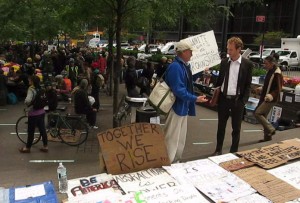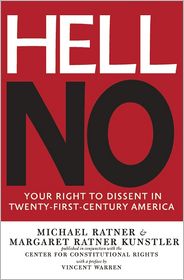Podcast: Play in new window | Download
Updates:
- Jose Couso Murdered By US Military In Iraq:
- Sami al-Hajj – Former Guantanamo Prisoner, Now Al-Jazeera Correspondent
- 44th Anniversary of Che Guevara’s Murder
- Who Killed Che? How The CIA Got Away With Murder
- Groups Follow Former U.S. President George W. Bush’s Path to Canada
- UK Protects Israeli War Criminal
- Anwar al-Awlaki’s Extrajudicial Murder – Michael Ratner
- Richard Falk – Afghanistan War
—-
Occupy Wall Street: Attorney Margaret Ratner-Kunstler
There is a North America-wide strategy to take away the right to mass protest. We’ve talked about the book Hell No: Your Right To Dissent in 21 Century America, but today we have both authors of this book in the studio, attorney Magaret Ratner Kunstler and our own co-host Michael Ratner.
In Hell No, the Center for Constitutional Rights, the country’s leading public interest law organization, offers a timely report on government attacks on dissent and protest in the United States, along with a readable and essential guide for activists, teachers, grandmothers, and anyone else who wants to oppose government policies and actions. Hell No explores the current situation of attacks upon and criminalization of dissent and protest, from the surveillance of activists to the disruption of demonstrations, from the labeling of protestors as “terrorists,” to the jailing of those the government claims are giving “material support” to its perceived enemies. Offering detailed, hands-on advice on everything from “Sneak and Peak” searches to “Can the Government Monitor My Text Messages?” and what to do “If an Agent Knocks,” Hell No lays out several key responses that every person should know in order to protect themselves from government surveillance and interference with their rights.
Attorney Margaret Ratner-Kunslter:
- This is a time that we don’t know the return dates are because they weren’t put throught the system, they were given desk appearance tickets or summons, people arrested on the Brooklyn Bridge and elsewhere.
- Politically what do you make of the fact that they let these people stay in the park? Perhaps Michael they had an opportunity to do something about it if they did something quickly.
- In Boston, they closed it down much more quickly. Each Lawyers Guild office has a hotline.
- They (the NYPD) actually led people down to the bridge walkway. There’s a law in New York that says you can’t block roadways, but you can march on sidewalks.
- They led people down to the roadway, then announced with a bull horn that not everybody could hear of the more than 800 people on the bridge – – you’re now doing something illegally and we’re going to disperse immediately or we’re going to arrest you. Most people were chanting, nobody could hear that announcement.
- Why do this? There was no place to put these 800 people. To get their names, to get their pedigree information, to do intelligence work.
- Early on with the RNC arrests, they had a sheet of paper asking what political affiliations they had. We stopped that quickly. The police department in New York City has a tremendous intelligence division.
- Some people we have no idea why they were arrested.
- Yesterday morning a young woman was chalking on the sidewalk, “good morning NYPD.” Not only was she arrested, but the people photographing her arrest, were arrested.
- Much of the planning on how to stop demonstrators, happened after Seattle 1999. At that point there was this training program that began with all of these local police forces across the country and the FBI. It wasn’t til 9/11 that they were fully funded.
- When Michael Ratner and I wrote this, we were totally depressed because we thought that demonstrations were over. There were so many ways of preventing demonstrations and people were penned.
- You can film the police in NYC. The law may be on your side, but the police don’t follow the law.
- If you’re recording audio, and only one party knows you’re recording, that’s ok in New York.
- The cop doesn’t have to give you his name, or badge number. If you ask a cop his badge number, he’ll give you the wrong number.
- I’d like to last through winter, I’m worried about these children. The demand for justice and equality is the demand basically all over the world.
- How can we say this is too abstract for us, isn’t this what we all want?
Guest – Magaret Ratner-Kunstler, an attorney in private practice. As education director at the Center for Constitutional Rights, she originated the Movement Support Network and authored “If an Agent Knocks.” Margaret is the President of the William Moses Kunstler Fund for Racial Justice, a foundation established in 1995 in the memory of her late husband to combat racism in the criminal justice system.
———

